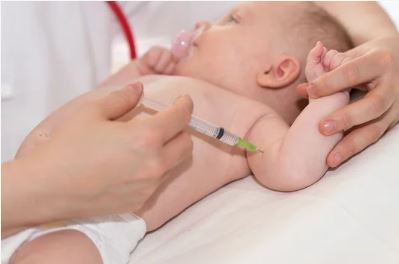An Essential Guide To Getting Your Newborn’s First Vaccines
Do vaccines protect against diseases? It’s a question that has been debated for many years, but the answer is clear: yes, it does. Vaccines are an essential part of protecting yourself and your family. And when it comes to newborns, getting their first set of vaccines is especially important.
Parents have relied on vaccinations for decades to protect their children from serious illnesses like measles, mumps, and rubella. Newborns also require protection against these and other health risks, so it is crucial to ensure they receive the proper immunizations at the right time.
Fortunately, a wealth of information is available online to help you understand the importance of vaccines for your newborn. You can also check with reputable medical providers, such as rexburgpediatrics.com.
This comprehensive guide covers everything you need to know about the different types of vaccines and their importance for your newborn.
The Importance Of Newborn Vaccinations
Vaccinations are essential for protecting your newborn’s health. They help prevent severe and deadly diseases in infancy or later in life. Specifically, they protect your baby against serious illnesses such as meningitis, measles, rubella, whooping cough, and polio.
It’s essential to stay up to date with all recommended vaccines for your baby during its first year. The Centers for Disease Control recommends a series of vaccines starting at two months old, which protect babies from different diseases. Remember that an updated vaccination schedule helps ensure complete protection throughout childhood and adulthood.
Types Of Vaccines
Vaccines act like a gatekeeper standing between your newborn and the world of disease. Protecting them from serious contagious illnesses is essential to their health and well-being. Vaccines come in many different types, and each is vital in keeping your baby healthy. Here’s a list of the required vaccines for your newborn:
1. Hepatitis B Vaccine
Hepatitis B is a serious virus that can cause severe liver damage in an infected person. It’s dangerous for newborns because they are more susceptible to the disease and have fewer options for treatment. That’s why it’s so crucial for parents to get their babies vaccinated against Hepatitis B shortly after birth.
The first dose of the vaccine should be administered within 12 hours of birth, followed by two additional doses at 1–2 months old and 4–6 months old. This will provide your baby with long-term protection from this potentially fatal infection.
2. Rotavirus Vaccine
Rotavirus is a virus that causes severe diarrhea in babies and young children. You should take steps to protect your baby from this virus, starting with a rotavirus vaccine.
This type of vaccine is usually given as part of a series of two or three doses at around two months, four months, and six months. The first dose should be administered between 6 and 14 weeks. Depending on which brand of vaccine you choose, an additional booster may be recommended at 15–20 months old. After these initial shots, no further vaccinations are necessary after one year.
3. Diphtheria, Tetanus, and Pertussis (DTaP) Vaccine
The DTaP vaccine is given in five doses. It is administered when a baby reaches two months, four months, six months, and fifteen to eighteen months. The last dose is given when the child is between ages 4 and 6.
Diphtheria is a serious bacterial infection that can lead to breathing problems, heart failure, or even death. Tetanus is a bacteria found in soil and animal feces that causes painful spasms leading to difficulty swallowing or breathing. Pertussis is commonly known as whooping cough, which can cause severe coughing spells with violent gasps for breath afterward.
The DTaP vaccine protects against all three illnesses for up to 10 years after administering the last dose. Side effects may include soreness where the shot was given, fever, or fussiness.
4. Haemophilus influenza type b (Hib) Vaccine
The Hib vaccine is an integral part of newborn vaccinations. As such, it’s essential to understand what it does and why your child needs it.
The Hib bacteria can cause serious infections in young children, including pneumonia, meningitis, and bloodstream infections. The Hib vaccine works by introducing a small number of harmless bacteria into the body, which helps build immunity.
It’s recommended that infants receive their first dose of the Hib vaccine at two months old, with follow-up doses at four months and six months. Your pediatrician may also give a booster shot between 12 and 15 months if necessary.
5. Pneumococcal Vaccine
The pneumococcal vaccine protects your baby against bacteria that can cause serious illnesses such as pneumonia and meningitis. This vaccine usually has two components: pneumococcal conjugate vaccine and pneumococcal polysaccharide vaccine. The first dose of this vaccine should be given to your baby at two months old, with an additional booster shot recommended for some children at four months old.
The risks associated with the pneumococcal vaccine are very low, and side effects are uncommon. Typically, they may include redness or swelling around the injection site, fever, fussiness, or loss of appetite.
6. Polio Vaccine
Polio is a disease caused by the poliovirus. It can lead to paralysis and even death, so your newborn must receive the polio vaccine as part of their routine immunization schedule. The recommended age for administering this vaccine is two months old or older.
This type of vaccination protects against all three types of polioviruses. After receiving two doses, infants are considered fully vaccinated against polio at one year. However, they’ll still need three more booster shots during childhood to maintain complete immunity throughout life.
Generally, common reactions include soreness at the injection site, fever, fussiness, headache, fatigue, and loss of appetite, but these should only last a couple of days after vaccination.
7. Measles–Mumps–Rubella (MMR) Vaccine
MMR is an important part of your child’s routine vaccinations. It protects against three contagious diseases: measles, mumps, and rubella. The benefits of getting this vaccine outweigh any potential risks associated with it.
All children should get two doses of the MMR vaccine, usually at 12 to 15 months old and four to six years old. Although some side effects may occur after vaccination, it’s typically mild in severity.
In addition, research has found that there’s no link between autism spectrum disorder and the MMR vaccine; therefore, you can rest assured when vaccinating your newborn against these diseases that they will remain healthy and safe. Taking into account all these facts surrounding the MMR vaccine, it’s clear why it’s so important to protect your newborn’s health now to avoid future complications down the road.
8. Chickenpox
This virus can cause a very itchy rash and fever, leading to other complications such as skin infections and pneumonia. Vaccines have been proven to be highly effective against this disease. The first dose of the chickenpox vaccine should be given at 12–15 months old, with a booster dose between 4 and 6 years old. It’s crucial to ensure that your child receives both doses to get maximum protection.
It’s normal for some children to experience mild side effects following vaccination, including tenderness or redness around the injection site and possibly a low-grade fever for up to two days after receiving their shot.
How To Soothe Your Baby After Vaccinations
Soothing your baby after vaccinations can be daunting, but it is essential for their emotional well-being. Getting ready to comfort a distressed newborn may seem overwhelming, but with the right tactics, you can make it much easier on both of you. Here are some helpful tips:
- Offer Cuddles And Feeding
After your baby receives their first vaccines, offering them cuddles and feeding is essential. Being held can be comforting for newborns. And it helps ease any pain or discomfort that the shots may have caused.
Providing a bottle or breastfeeding right after getting vaccinated is also beneficial. Doing so keeps them hydrated and full. Breastmilk is especially helpful as it contains antibodies that help protect against disease-causing germs and viruses. Plus, the sucking reflex associated with breastfeeding releases calming hormones called endorphins, which can reduce stress levels in babies.
You need to care for your little one following their vaccinations by providing extra attention, warmth, comfort, and nourishment.
- Request A Topical Anesthetic
When getting your newborn their first vaccine, you may request a topical anesthetic for your child to ease this fear and discomfort. By taking advantage of this option, both you and your baby will be more relaxed during the process.
Using a topical anesthetic is easy and simple. It’s applied using a cotton swab or cloth and numbs the area where the injection occurs. It typically takes about 10 minutes for the medication to take full effect, so ensure you give yourself plenty of time before your baby’s appointment.
Additionally, many pediatricians offer this form of pain relief as standard practice. So, don’t hesitate to ask if it’s available.
- Offer Acetaminophen
It’s vital to offer acetaminophen after each vaccine your newborn receives. Acetaminophen helps reduce pain or discomfort following the injection and can help prevent fever from developing. Follow the instructions on the package for the correct dosage according to your baby’s weight. If you are unsure how much to administer, check with your doctor before giving it to your child.
You’ll also want to be prepared with additional doses of acetaminophen if needed, as fever sometimes develops 12–24 hours after vaccination. Make sure you know when and how often you should repeat the dose if a fever develops later. Your doctor should provide this information, so don’t hesitate to ask questions if anything is unclear.
Conclusion
It’s heartbreaking to watch your newborn get their first set of vaccines, but it’s a necessary part of being a parent. Vaccinations are essential in protecting your newborn from many diseases and conditions that can be life-threatening. So, when you feel overwhelmed or anxious as you prepare for your baby’s first round of vaccines, note that despite the pain and discomfort, you’re providing them with a lifetime of protection.




